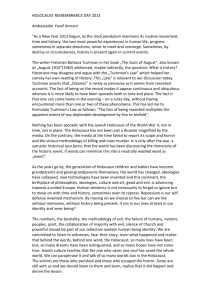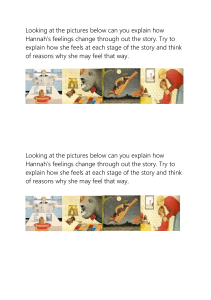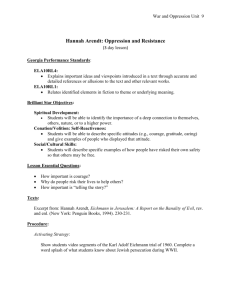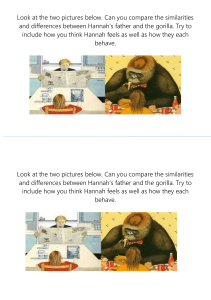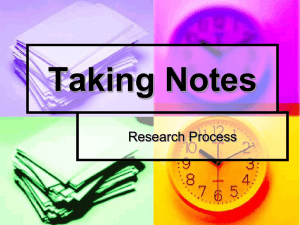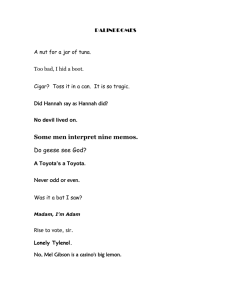Eichmann Trial Analysis: Historical & Psychological Perspectives
advertisement
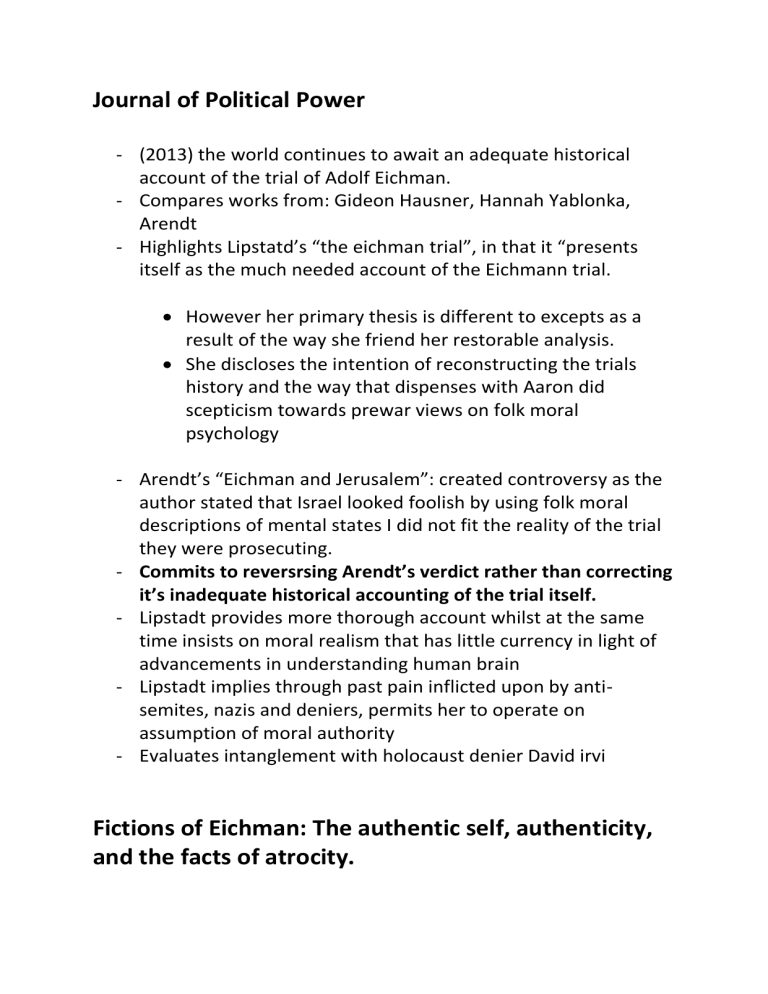
Journal of Political Power - (2013) the world continues to await an adequate historical account of the trial of Adolf Eichman. - Compares works from: Gideon Hausner, Hannah Yablonka, Arendt - Highlights Lipstatd’s “the eichman trial”, in that it “presents itself as the much needed account of the Eichmann trial. However her primary thesis is different to excepts as a result of the way she friend her restorable analysis. She discloses the intention of reconstructing the trials history and the way that dispenses with Aaron did scepticism towards prewar views on folk moral psychology - Arendt’s “Eichman and Jerusalem”: created controversy as the author stated that Israel looked foolish by using folk moral descriptions of mental states I did not fit the reality of the trial they were prosecuting. - Commits to reversrsing Arendt’s verdict rather than correcting it’s inadequate historical accounting of the trial itself. - Lipstadt provides more thorough account whilst at the same time insists on moral realism that has little currency in light of advancements in understanding human brain - Lipstadt implies through past pain inflicted upon by antisemites, nazis and deniers, permits her to operate on assumption of moral authority - Evaluates intanglement with holocaust denier David irvi Fictions of Eichman: The authentic self, authenticity, and the facts of atrocity. - Was a trial of Absolutes, in which neither truth nor moral judgement could exist in fragments or parts - Hannah Arendt, describes the law as unequipped to deal, on a human, political level with a guilt that is beyond crime and an innocence that is beyong goodness or virtue - Decription of Nazi’s as “beyond crime” may have been a way of underscoring the extremity of Nazi brutality. - “path of poetry” - In her view it was unclear what eichmans testimony was meant to prove since his guilt was it already largely manifest - “A thesis on the banality of evil”: question about the nature of evil self as much as an inquiry into eichmans crimes This report return away from the courts assessment of the evidence provided within the trial and shifted towards a meditation all the evidence meant in a sphere of cosmological moral judgement -she makes the point that the spectacle of the trial to prove something else apart from whether eichman was guilty of the crimes for which he stood accused -was more than just an illegal tempt to authenticate the facts of his crimes, but found centre of gravity in a moral purpose – in an attempt to pinpoint the nature of his evil -after this statement she looks into the witness testimony ( see paper for detail) -in her perspective the testimony locked capacity to solve the unresolvable question of where ‘morals and ethics arises’ -continue to describe the panel quality of Eichmann’s evil, the quality that becomes impossible to render in legal and dramatic terms. As banality has no roots, is not rooted in evil motors or urges or strength of temptation and rather banality was doing as everybody else did, being swept away by the judgement of others and never giving the matter much thought -it is this in which the author concept of Eichmann banality is precisely that it is both plotless and agentless, that Eichmann lacked an ‘authentic self’, that evil lacked and a central motivating force -the aim of the designs of the proceedings never was to establish the facts reality of his crimes but rather sought to evidence a form of evil that to seem to defy logic within a legal and moral form of judgement -she notes the contradictions between the courts and to establish the authenticity of radical evil and its insistence on breaking such an evil down into recognisable, Banally logical, factual terms -see page 1248 for her encounter with Eichmann in the Jerusalem court -Arendt finds that in the Eichmann trial, between what the evidence could prove that what he had done, and the enormity of what his actions had caused, lies a deeper contradiction This contradiction being between the individual facts of evil doing and the horrifying some of these factual parts -characterises eichman as a ‘reflective consciousness whose actions and utterances are the outcomes of, also the response to what he understands his situation to be -His evil only consolidated upon the witness stand in which his inability to conceptualise his acts and his role in producing the mass murder of Jews was vital. -notes eichmans inability to understand the relationship of course and effect between his Beno orders and horrific outcomes -eichmann himself put it, my name became a symbol. That symbolism and played more than the incomprehensibility of imagining the atrocity itself 1252 - from Nuremberg to Hollywood, the Holocaust and the court room in American feature film First trial to be televised, was watched in great numbers. These broadcasts were probably the first exposure American audiences had to the use of the word Holocaust to describe the Nazi persecution of European jewry. -the significance of being televised is found in the way it’s spurred at least some American authors and playwrights, to deal with it psychological effects and moral questions -is it possible for traumatic historical events like the Holocaust to be appropriately and adequately explored, either by art and literature or by fields like psychoanalysis and law Eichmann’s mind: psychological, philosophical, and legal perspectives by José Brunner -the essay discusses various representations of items mind that were fashioned on the occasion of his trial in Jerusalem in 1961 -provides insight into Gideon Hausner’s perspective in depicting Eichmann as daemonic - And similarly describes Hannah Arendt’s perspective as describing the defendant as banal or thoughtless -knowledge is the widely discussed perspectives of Gideon and Hannah and instead notes you’ll be talking about the perspective formulated by the mental health experts who examined Eichmann for the prosecution -Hannah arendt covered the trial for the New yorker -makes a valuable comments in regards to analysing personal psychology. He reads we have only limited and indirect access to the inner workings of the mind based on interpretation of phenomena believed to hold evidence of its hidden, internal dynamics. Since our in the life is intangible and cannot be examined directly, it is open to contradictory interpretations, none of which can be fully corroborated or falsified - José Brunners interpretation of Hannah Arendt’s comments on the trial. In fact referred to the finger wagging figure out the house and a cut of the trial. However, as we shall see below, she seems to have taken some poetic license in her reporting. And that throughout most of the trial he is portrayed either as a daemonic character or a Beno individual, this essay argues that even at the time of the trial, these two opinions were not the only ones available -analysed the expert Report conducted during the trial and summarises that the Kulscars in the article, describe him as a week and also in the core of his psyche, yet governed by a Nazi Morocco they did not allow for any weakness. In order to conceal his weaknesses from self and others, he learnt to play the role of a strong man who was never passive and had no need for help from others -continued reading into the psyche report and analysis and the fact that according to the psychologist, I can lived in the “throes of existential fear”, yet at the same time, he was consumed by aggression, which caused him anxiety “he feared the forces that resided in him, because he felt he was unable to dominate them.” - Kulscars observations continue to state that I’ve been as an anxious man who spoke too much, was attached from his feelings, with no close friends, and afraid of strangers – a feature that may not be all that’s apprising in relation to another criminal waiting a probable sentence of death -“ his language… Like his view of the world, was lifeless and mechanical, formalised and humanise” -Shlomo Kulscar argued, although Eichman did have some capacity for empathy, he used it only for exploitatively and regarded others not as full human beings but as extras or props. -this conclusion is contradicted with the fact that eichman exhbits alarm whenever confronted with violence or aggression in the tests. -this came to form that both the scientists were inclined to believe that instead of eichmans avoidance and denial of aggression as a ploy and see it as evidence of a deep seated feature of his personality - Read into the analysis of Szondi “the test subject was a criminal with an insitiable killing intention” - Eichman homicidal tendencies were scientifically certified by means of a test developed by a Jewish Holocaust survivor who certify these tenancies on the basis of theories not unlike those that had lain at the foundation of the Nazi ideology -goes into the perspective of Hannah Arend, in that perspectives previously discussed in his paper had dramatically opposed her own -summarises that had his perspective was that she argued that the enormous Evil conducted by the Nazis cannot be attributed as a sign of daemonic in a life on the part of those she had planned and executed it -Hannah supported the previous note saying that if I can really was as dangerous and carried an insatiable urge to kill, he belonged in an insane asyum - these statements by Hannah were rejected by the Kulcsars, on the ground that Shlomo Kulcsar had been the only psychiatrist who had met I can personally -continues to interpret Hannah’s perspective quoting Hannah herself “the longer one listen to him, the more obvious if I can do he’s an inability to speak was closely connected with an inability to think, namely, to think from the standpoint of somebody else” -“he did not think” -hannah, the activity of thinking-insofar as it was of relevance to the question of arguments evil deeds – meant something like empathy or the ability to identify with points of views of others -Hannah “the soul experts”, Arend’ts dismissive attitude to psychologists, psychiatrists ad their crafts -for José Hannah presented her form of understanding as transcending the division between exterior and interior, performance and reality, appearance and truth. For her, the essential was not beneath the surface. Rather, the surface of human conduct itself revealed uniqueness, plurality, and splender of life -QUOTE FROM HANNAH “everybody is swept away I’m thinking about what everybody else does and believes in, those who think are drawn out of hiding because they’re refusal to join is conspicuous and thereby becomes a kind of action. In such emergencies, it turns out that the purging component of thinking is political by implication… Has a liberating affect on another faculty, the faculty of judgement, which one Michael was with some reason the most political of men’s mental abilitie” -Hannah asserted a close connection between thinking and judging, notion to which he intended to devote the never written in third volume of the life of mind. -I come in in Jerusalem attributed the necessity of putting Eichmann on trial to thoughtlessness. Legal judgement had become a central because I can lacked the mental capacity for moral judgement, as Hannah illustrated in her chapter on the 1C conference of January 1942, whether decision on the final solution is made at which I can acted as secretary. ‘Eichman is my Father’: Harry Mulisch, The Eichmann Tiral and the question of guilt: -Pepijn Cordwener -within this article Corduwener compares the perspectives of Hannah Arendt and Harry Mulisch -“the signigficance of the trial lies in it’s after life”, with it’s legacy being largely shaped by Hannah Arendt’s Eichman in Jersusale. A report on the Banality of Evil. -Interprets Hannah’s report as an attempt to hold a middle way between a historical narrative of the Holocaust, a biography of Eichmann’s life and description of the trial in Jerusalem - - Is that Sophia Hannah neither antisemitism nor insanity was behind icons conduct and instead was a not too clever but ambitious man who nearly followed orders - And the fact that he liked the ability to Think empathetically and this was the essence of the banality of evil that he has come to epitomise -
